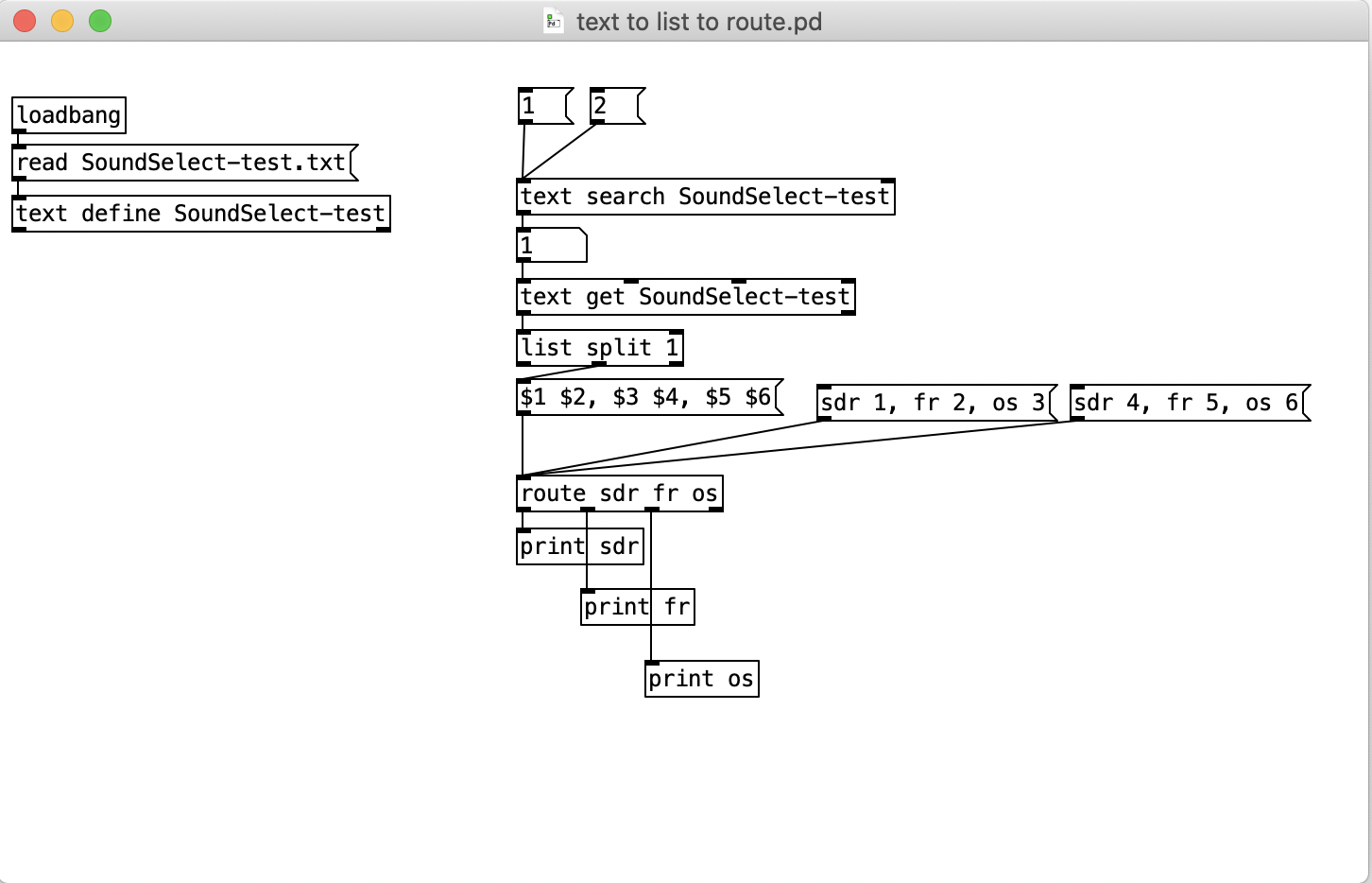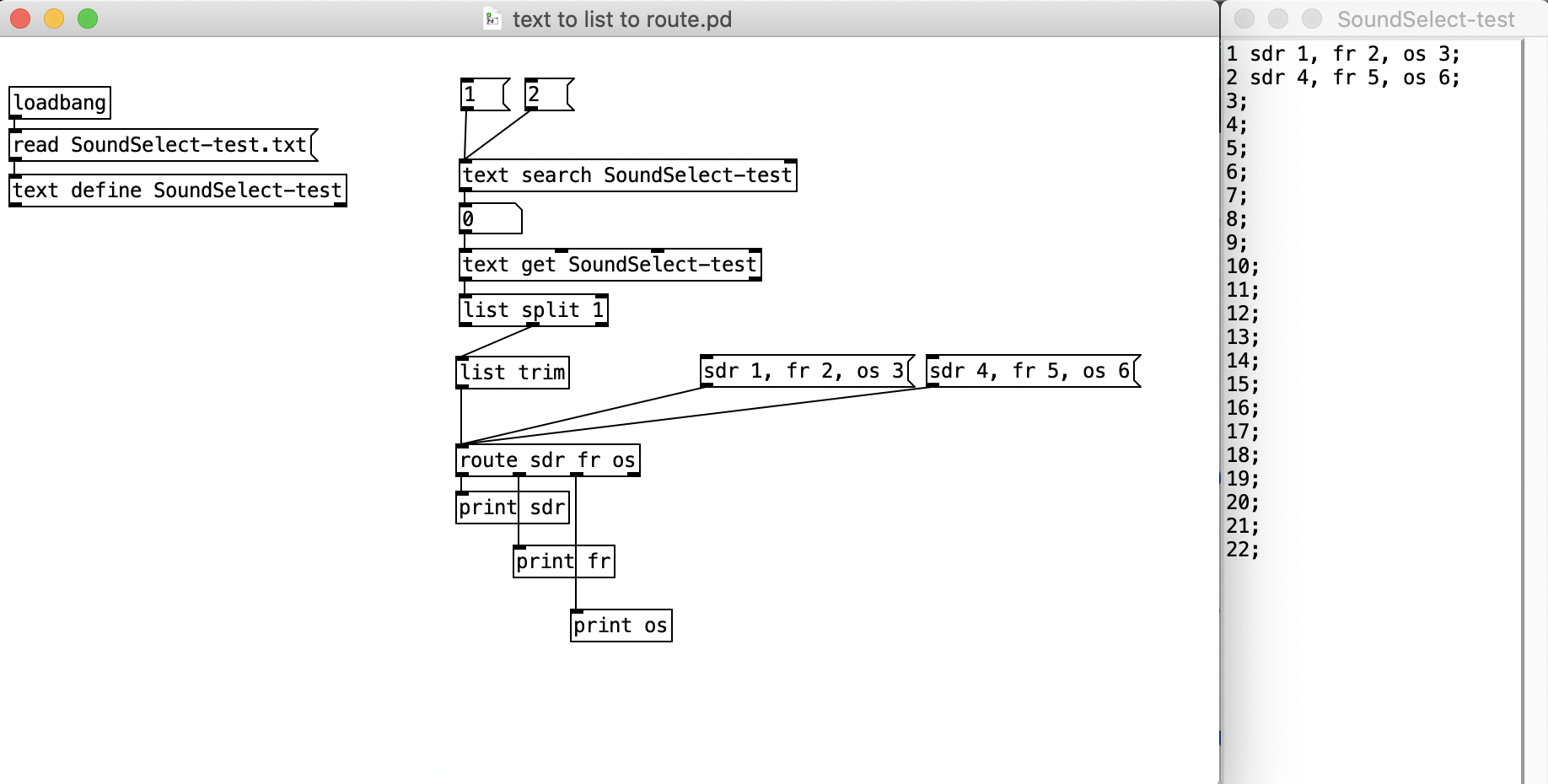-
me-andmymonkey
posted in technical issues • read more@whale-av ah, that's a beautiful solution! Thank you
-
me-andmymonkey
posted in technical issues • read moreThanks @alexandros.
So, if I just don't have the commas in the text file, I can output a line and format from there, like so:

But can I get [text get] to just output all of the comma separated line from the text file?
-
me-andmymonkey
posted in technical issues • read moreOkay, so I've got a text file with a number of fields. Each starts with a number, which is followed by comma separated lists, consisting of 3 symbol/float pairs.
The idea is to use [text search] to find the line with the correct number, feed that to [text get] to get all the data in that line, trim off the leading number (and the 'list' identifier) and then send the comma separated lists to a route object, which will route the floats to their respective destinations.
At the moment using [text get] allows me to access the first symbol/float combo. However, I cannot access the second and third symbol/float combo in the comma separated list. This is where I am getting stuck. I don't know how [text get] is dealing with the data and how to access it correctly.
Any advice on how to do this?
Here's a screenshot showing the patch and the text file I am using. Here's the patch: text to list to route.pd and text file: SoundSelect-test.txt

-
me-andmymonkey
posted in technical issues • read more@lacuna I'm currently just playing files using [readsf~]. I'm only using [soundfiler] to get the sample length of the next audio file I want to play, so I can figure out what random snippet from it I want to play.
Each audio file might be up to hour or two in length, and there are around 40–50 files the patch can choose from at random, so loading them all into array doesn't seem very efficient to me.
I need the number of samples (and sample rate) of the file in order to do this. [soundfiler] just seems very heavy handed for all I want to do.
[soundfile_info] works perfectly. I'll look into these other solutions you'e flagged.
-
me-andmymonkey
posted in technical issues • read more@seb-harmonik-ar I got it working too actually. But I'm still curious about Vanilla-friendly solutions if there are any!
-
me-andmymonkey
posted in technical issues • read moreOkay, so I know [soundfiler] does exactly this: gives the sample size of a file from its left outlet. However, it is also heavy handed, in that it is causing audio dropouts while another file is playing using readsf~
I know that [soundfile_info] from iemlib does this. However, it's not compiled for 64 bit MacOS and I also need it to run on a Raspverry Pi as well.
Are there other solutions?
-
me-andmymonkey
posted in technical issues • read more@oid right on. Thanks very much. Lots of learning in this stuff. Thanks everyone.
-
me-andmymonkey
posted in technical issues • read moreHey all, this is a really tidy solution to the problem. I was not aware of the 'urn' object. I assume this is a Max thing that's been brought over to PD.
@whale-av by index I mean, the position of a value in a list message. I hope that makes sense!
@ingox really interesting! I still haven't really dived into the [text] object. I'm still only getting my head around lists.
To make things a little bit more complicated, I also wanted to make it so that instead of totally clearing the 'check list' in my patch (that stores the index values), the list keeps the final 5 values. This would mean that when the 'check list' resets, it still won't output the last 5 values from before the last reset.
I've figure out a way of doing that using [list split] that seems to work well. I'd be curious as to how it would work with [text].
Anyway, thank you both so much. This is great.
-
me-andmymonkey
posted in technical issues • read moreHello,
So I've been working on this abstraction that is supposed to select a random element from a 'to use' list, without repeating until every element from the list has been selected.
Each time the list is fed in, another 'check' list stores what index has been used, checking to see if the random index generated has been previously used. If it hasn't, that index is used to pick from the 'to use' list. If the index has been used previously, then a new random number is generated.
If the length of the 'to do' list and the 'check' list are the same, then the 'check' list is cleared and the process starts from fresh.
Okay, so the abstraction I've made technically works. However, I am getting a nasty stack overflow problem when the 'check' list resets. When I trace the error from Pd says that it's coming from the [list-abs/list-find] abstraction I'm using.
Here's the patch: patch.zip
I'm struggling to find a way of getting over this error. Sort of stumped. Any help / a simpler way of getting around this problem would be great...
-
me-andmymonkey
posted in technical issues • read more@toxonic thanks for this!
Another library I found with a nice spatialisation external for 4 and 8 channels is this: https://github.com/solipd/AudioLab. Check out pp.spat4~ and pp.spat8~
